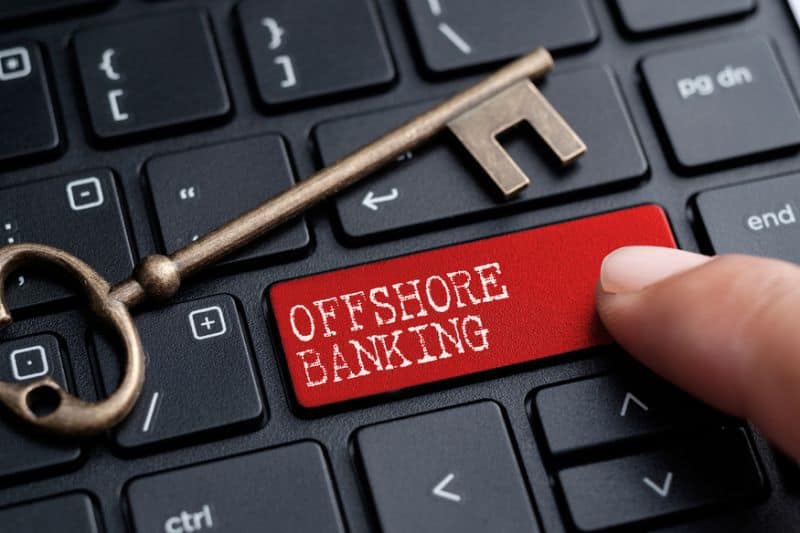Open an offshore bank account
Open an offshore bank account

Do you want to open an offshore bank account?
Contrary to what most people believe, opening an offshore account is easy and once you meet the requirements, the process can take as little as a few hours.
Just like opening a bank account in your home country, the process of opening an offshore bank account is less demanding. However, offshore banks have different requirements.
For example, the details and documents required to open an offshore bank account with a bank in the Cayman Islands may differ slightly from the requirements of a bank in Switzerland or the bank in the Channel Islands.
For this reason, it is important that you first do background research to ensure you meet all banking requirements before opening an offshore bank account. What you need to know is that offshore banking is perfectly legal.
Once you understand all the requirements and have valid reasons for opening an offshore bank account, you should consider opening one.
Why Open an Offshore Bank Account?
Offshore banking is becoming increasingly popular for a number of reasons. Contrary to the assumption that people open offshore bank accounts for immoral reasons, there are a number of good reasons why you should consider opening an offshore bank account.
The main benefit of having an offshore bank account is tax efficiency. Most foreign jurisdictions are tax havens. That means they have no or a low tax rate. People are also opening offshore bank accounts for convenience.
Regardless of your location, an offshore bank account can be accessed at any time. The account also offers high interest rates. This is especially true when it comes to a long term.
Plus, it’s easier to transfer money from an offshore bank account to your domestic bank. Most offshore banks also employ financial professionals.
Any person running a global business undoubtedly wants to work with international banking professionals to share their knowledge and experience.
But despite the benefits of opening an offshore bank account, you should seek expert advice and also do your own research before taking any step.
Basic requirements for an offshore account
If you have opened a bank account in your country, the process for opening an offshore bank account is the same.
As financial institutions have different requirements and policies, the process may vary from bank to bank. However, there are some basic requirements that all banks require you to meet.
For example, personal data such as name, address, year of birth, profession and nationality are required.
There are also other documents that are required for verification purposes, including your driver’s license, a copy of your passport, or other government-issued documents.
Your home and residential address will also be required as these may have tax implications.
While domestic banking and offshore banking follow the same process when opening an account, some additional details are required when it comes to an offshore bank account.
These additional requirements are designed to prevent offshore banking-related vices such as tax evasion, money laundering, and other prohibited activities. These additional requirements include financial reference documents.
These documents should be provided by your current bank and they should clearly state average account balances as well as your financial history and reputation.
A bank statement of six to twelve months is required as proof that you have a “satisfactory relationship” with your current bank.
There are other offshore banks too, most of them actually, that will require you to declare the type of transaction that will take place through your offshore bank account.
While it may seem like an invasion of privacy in some ways, the primary goal of this requirement is to prevent illegal activity.
In order to ensure that you only open the account for the best of reasons, it is required that you provide additional documents stating the sources of funds being deposited into the offshore bank account.
For example, you will need to provide payslips if the funds are from your employer, or investment information if the funds are income from investments.
Many offshore banks require an initial deposit when opening an account. The amount to deposit varies by bank.
Choosing the best currency when opening an offshore bank account
Compared to domestic banks, where you have to decide on a specific currency;
Offshore banks give you the option to choose a currency.
Indeed, this is one of the best features that make offshore bank accounts attractive. It can come in handy when you have an unstable local currency.
However, it is imperative to first understand the pros and cons of holding the funds in different currencies.
For example, there are currencies that allow account holders to earn interest on deposits, but this can also result in foreign tax liability.
It can also be expensive if you want to make deposits or withdrawals. This is because you need to convert currencies and exchange rates can be expensive.
How to deposit funds into your offshore bank account
Most offshore bank accounts allow electronic deposits through electronic transfers. The only problem is that most systems used to deposit funds electronically in domestic countries do not work globally.
This way of depositing funds into your offshore bank account is easy, although an international transfer fee is often charged when you deposit or withdraw funds from your account.
This fee usually varies from one offshore bank to another, which is important to do background research on the best deals before opening an offshore bank account.
How to withdraw funds from an offshore bank account
If you have an offshore bank account, you can withdraw funds in a number of ways.
Most offshore banks allow ATM withdrawals, which can help you access your money regardless of your location.
But you should confirm the fees first to make sure they are affordable. ATM withdrawals tend to be expensive, but you can still cut costs by making large withdrawals at once.
There are also other offshore banks that allow check withdrawals. However, this option is usually discouraged for confidentiality reasons.
Another problem is that if the check is drawn on an offshore account, it may not be accepted by your domestic bank.
Most offshore bank account holders prefer to use two accounts; a domestic bank account and an offshore bank account.
This alternative allows you to transfer large amounts of money from your offshore account to your domestic bank account.
It is actually the most convenient method as you are guaranteed security and privacy.
Search for the best banking jurisdiction
Whether you want to open an offshore bank account for asset protection, currency diversification, or to earn higher interest on your savings, it can be a good decision for any serious investor.
But there are three most important factors that you need to consider first, even before going abroad.
First, it must be ensured that the offshore jurisdiction is politically and economically stable. You should also consider the reputation of the offshore jurisdiction.
There are some foreign jurisdictions that have been blacklisted by the world community and you obviously do not want to open a bank account in such jurisdictions.
The country you choose should also promote confidentiality of information. Some people open an offshore bank account to maintain confidentiality.
In this case, make sure that your bank account details are not shared with third parties without your consent.
The final result
Some people shy away from opening an offshore bank account due to the negative perception that the accounts encourage illegal activity.
But as long as you disclose the offshore bank account activities, you have the right to open an account without government interference.
Before opening an offshore bank account, it is also advisable to seek professional advice on the consequences of not complying with offshore banking rules.
All in all, opening an offshore bank account is easy and the funds are easily accessible. There are some banks that don’t lend their money to borrowers to make more profit.
The banks only make money from the cross-border fees and account maintenance fees they charge.
It is also important to consider what these fees are before committing yourself to an offshore bank.
—————-
We’ve helped hundreds of people move their businesses overseas, legally reduce their taxes, and become dual citizens. We are focused on high-net-worth individuals and their families as well as corporations wishing to invest their offshore companies or even secure their wealth in offshore financial centers around the world. We will help you to find the best solution for setting up an offshore or onshore company. Another special area of our full-service consulting is the investment opportunity and solution in Europe, especially in the Balkans, Africa, Asia, UAE, the Caribbean and the Pacific.
If you are looking for it, please feel free to contact us. We create a holistic plan that serves your purpose.
TCME – Group worldwide is a leading professional International Business Investment and Advisory Firm for Foreign Economic Relations, with 17th. departments in different Countries around the world and the Headquarter in Malaysia.
GCI UNIT Worldwide, designs and implements customized, holistic strategies for successful investors and entrepreneurs to legally reduce their tax bills, diversify and protect their wealth, invest abroad, gain a second citizenship and live a freer life worldwide to lead.
YOUR CHANCE FOR A BETTER LIVE
GCI Unit Worldwide firm is a professional International Business Investment and Advisory Firm for Foreign Economic Relations. Our range of services includes:
• Offshore and Onshore Company Formation,
• executive Search,
• IT & Cyber Security Protection
• African Gold & Diamonds
• international Business & Management
• Citizenship & Residency
• Investments & Corporate Financing
• Mining and Trading
• Advisory for Foreign Economic Relationship
• Diplomatic Consultancy & Public Affairs
If you would like to discuss your internationalization and diversification plans, book a consulting session* or email us under: [email protected]
*A counseling session is a conversation about your portfolio and goals. It does not constitute legal, financial, tax or investment advice.
Department GCI – Unit Global Citizenship Investment (GCI Unit worldwide)
by TCME Worldwide Group – Global Investments –
Level 33, Ilham Tower, 8 Jalan Binjai,
Kuala Lumpur 50450, Malaysia
www.tcme.company
www.citizenship-news.com
Phone: +66 99091 8357 also for WhatsApp





